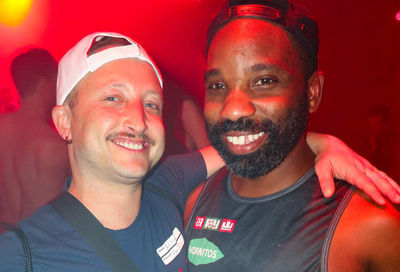Theater Review: ‘Oil’ at Olney Theatre mixes fossil fuels with mundane drama
Ella Hickson's "Oil" simmers and simmers without ever reaching a proper boiling point

Sometimes no matter how carefully the pot gets stirred, ingredients just don’t coalesce into a fully pleasing whole. That’s the case with Tracy Brigden’s staging of Ella Hickson’s Oil (★★) at Olney Theatre. Or perhaps it’s an issue with Hickson’s play.
First performed in 2016 at London’s Almeida Theatre, Oil ambitiously combines elements of kitchen sink drama, feminist social history, and science fiction to tell a story spanning 160 years of humanity’s unabated dependence on petroleum.
Or, rather, the unfolding chronicle of how oil shaped the world serves as the mere skeleton upon which Hickson hangs the more predominant tale of mother May (Catherine Eaton) and daughter Amy (Megan Graves). The characters’ individual and mutual journeys, shaped by sex and gender politics, class, colonial power, and the advent of petroleum-powered technology, are depicted via a different May and Amy playing out scenes of their family drama across vastly different eras and locations.
Leaping through decades from May’s candlelit drudgery on a farm in late-19th-century Cornwall, to her servitude at a British colonial outpost in 1908 Tehran, to 1970 London, where she runs a corporate drilling investment firm while raising her rebellious teen Amy, Oil attempts to magnify mother and child to epic proportions. They are woman, the clarion voices of progress alongside the ebbs and flows of crude.
Although, so much of what concerns them and their families and their squabbles might just as easily relate to some other product. Oil could be Coffee, or Sugar, or any number of other influential commodities, for all that oil winds up actually having to do with the power dynamic between mother and daughter.
Hickson peppers scenes with details, like a mention of those new-fangled motor cars, that do plot the historical importance of petroleum to empires and households. Points are relayed or reiterated via video projections and sober narration by a number of characters. One projected interlude introduces the gas-guzzling machines of industrial warfare. But, for all the sounding off on the modern age of oil, on capitalism and the environment, it’s May and Amy’s relationship that emerges as Oil‘s true subject matter. Fossil fuel seems to be just the juicy hot topic baiting the hook for a fairly mundane mother-daughter drama.

Eaton and Graves’ performances in the roles at least elevate the struggle between chilly, pragmatic mom May and her headstrong, free-spirited chip off the old block. In particular, Part Four of the play, set in near-future Baghdad, allows Graves the space in a lengthy, well-written monologue to bring the play’s many shifting layers into focus in one piercing expression of Amy’s anger and determination.
As good as Graves is, though, the scene might leave some wondering what on earth this second act moment has to do with the play’s earlier scene of kerosene entrepreneur Whitcomb (Maboud Ebrahimzadeh) trying to buy the Cornwall farm out from under May’s recalcitrant husband, Joss (Chris Genebach). Yes, there’s the consistent presence of black gold in the background, or on the periphery, of each story, but what Amy’s shouting her heart out about in the Iraqi desert seems worlds apart from Joss and May and Whitcomb back in Cornwall.
Brigden teases out that first scene on the farm at the pace of a cold country night in the dark times before electricity. The 90-minute first act does not fly by, but thankfully, the pace picks up with the plot’s trip to Tehran, featuring Christopher McLinden’s charged turn as Officer Samuel, a British envoy tasked with persuading the Persians to sell off more and more of their petroleum to the empire.
Here, Hickson locates a moment pivotal to both the title subject and to the true subjects, May and Amy. Too rarely do those thematic stars align in this loose exploration of human progress and man’s exploitation of a finite resource. The playwright’s pot simmers and simmers, but without reaching a proper boiling point.
Oil runs through March 31 at the Olney Theatre Center, 2001 Olney-Sandy Spring Road, Olney, Maryland. Tickets are $40 to $84. Call 301-924-3400, or visit www.olneytheatre.org.
Support Metro Weekly’s Journalism
These are challenging times for news organizations. And yet it’s crucial we stay active and provide vital resources and information to both our local readers and the world. So won’t you please take a moment and consider supporting Metro Weekly with a membership? For as little as $5 a month, you can help ensure Metro Weekly magazine and MetroWeekly.com remain free, viable resources as we provide the best, most diverse, culturally-resonant LGBTQ coverage in both the D.C. region and around the world. Memberships come with exclusive perks and discounts, your own personal digital delivery of each week’s magazine (and an archive), access to our Member's Lounge when it launches this fall, and exclusive members-only items like Metro Weekly Membership Mugs and Tote Bags! Check out all our membership levels here and please join us today!























You must be logged in to post a comment.